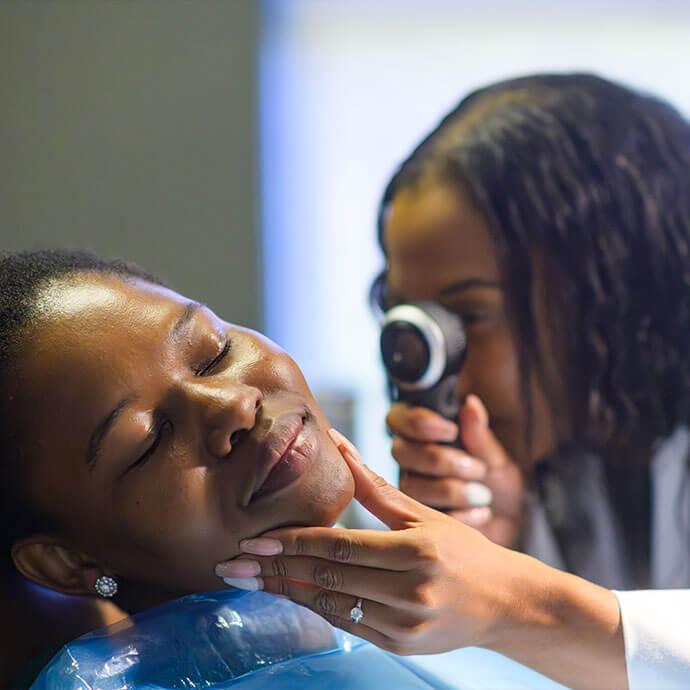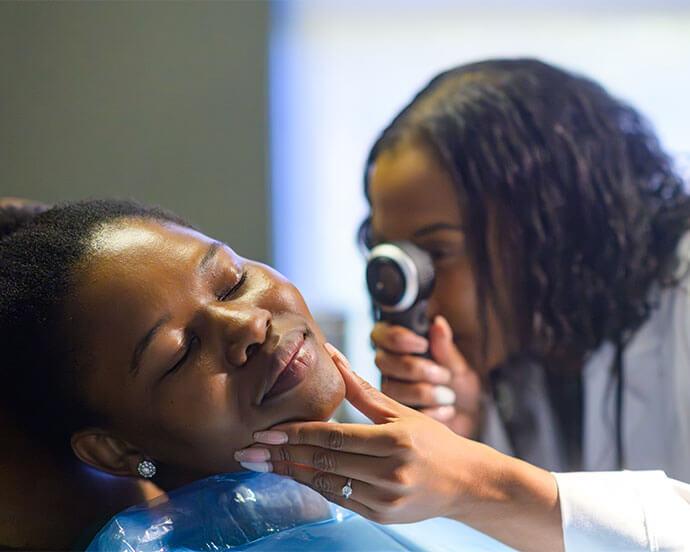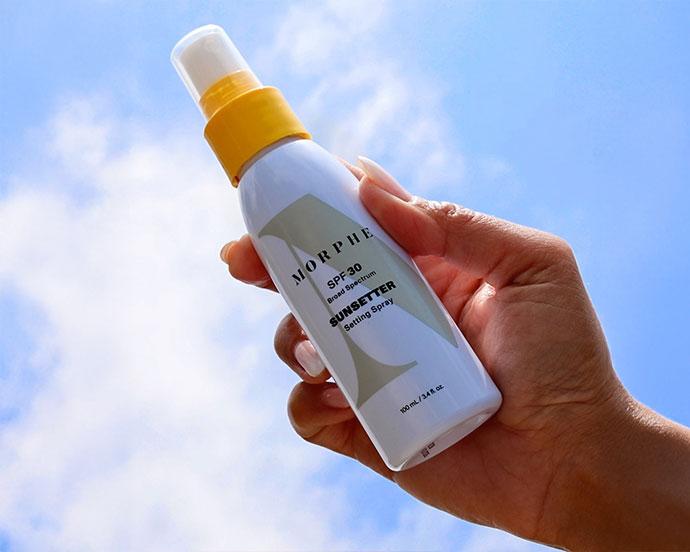15 Easy Tips to Help You Prep for Your Upcoming Dermatologist Skin Exam



Ashley Locke


Photo by wilpunt / Getty Images
Skin self-exams should happen regularly—almost daily, if you can make it happen—but nothing beats an in-office dermatologist skin exam. Sometimes (and by “sometimes” we mean often), you need a thorough examination of a suspicious new red spot that’s appeared on your face, or a mole that seems to be growing as the years go on. That’s when you make an appointment with your derm for a skin exam. What’s a skin exam, you may be wondering? Board-certified dermatologist Leena Ramani, MD, details what to expect:
“A medical assistant will room you, collect your medical history and medications, ask if you have any new or changing spots of concern, and then ask about your sun exposure history, including if you've ever had a blistering sunburn, if you've ever used tanning beds, or if you spend a good deal of time outdoors,” Dr. Ramani tells IPSY. “They'll also ask about any relevant family history of skin cancers or conditions. Next, you will be asked to change into a gown. Some offices will ask that you remove all undergarments; some say they can be left on. But if you have a spot of concern in a private area, please let your dermatologist know. The dermatologist will then do a complete exam from your scalp to the bottom of your feet.” A dermatoscope is used to examine the skin, “magnifying lesions to better assess them,” says Dr. Ramani. She notes that she tells her patients of any benign growths she notices “to make sure you know they’re nothing to worry about. If there is a spot concerning for skin cancer, we will mark and photograph it and discuss follow-up steps, which typically include a skin biopsy.”
Now that you know what to expect during a skin exam, we wanted to share how to best prepare for one. When any type of skin cancer is suspected, you want to be as ready as possible for your dermatology appointment. With the help of Dr. Ramani, we put together a guide on how to prepare for a dermatologist skin exam.


It's about glam time you treated yourself.
MEET THE EXPERT
Leena Ramani, MD, is a board-certified dermatologist. Specializing in hair loss, transplantation, and regenerative therapies, Dr. Ramani is on a mission to educate and empower her audience while debunking myths and making dermatology accessible to all.
15 Ways to Prepare for a Dermatologist Skin Exam
1. Bring Records of Previous Skin Exams
Dr. Ramani shares that for new patients, it’s important to “bring records of previous biopsies and skin cancer treatments.” This will help your derm know which areas they need to pay attention to and why. While they’ll check your entire body, knowing your previous areas of concern allows them to better assess if that suspicious spot requires additional monitoring or further treatment.
If bringing a physical copy of your records isn’t possible, we’ve found that when we switch derms and call our previous provider, they’re often able to transfer our medical records over. Don’t be afraid to call your previous dermatology office so they can give your new dermatologist all the info they need ahead of your skin exam.
2. Remove Any and All Nail Polish
Whether it’s on your fingernails or toenails, Dr. Ramani says to get rid of your nail polish. You may be wondering why, and the answer is quite simple: Nail health can often be an indicator of skin health. During the exam, a derm will check your nail beds for signs of melanoma or other skin cancers. If you’re wearing polish, they won’t be able to best examine your skin. Not to mention, even if your nail beds are cancer-free, there could be other conditions your dermatologist may point out.
3. Wear Something Easy to Change In and Out Of
You will receive a full-body skin exam, one that often requires you to change into a gown at your checkup. Because of this, Dr. Ramani recommends that you “wear an outfit that is easy to change in and out of.” Think something loose-fitting that won’t obscure your derm’s ability to perform a thorough examination, like the YOUNIQUE ALMOST FAMOUS Hoodie Dress.
4. Don’t Wear Thick, Strappy Sports Bras
There’s a good chance you will remove whatever you’re wearing to swap it for a gown during the exam. “If you don’t plan on removing your sports bra, avoid something thick and strappy,” says Dr. Ramani. “It can be hard to properly examine under the bands.” Wear something with thin straps that can easily be moved around as needed. Or, better yet, avoid wearing a bra and embrace the freedom.
5. Remove Watches and Jewelry
You guessed it: Watches and jewelry can get in the way. You don’t need to wear any accessories to your exam. Keep the IPSY Passion Pop clutch in your bag to store your rings, bracelets, and more during the exam.
6. Take Photos and Create an Album to Share
If you have patches or growths that are concerning, be sure to snap pictures of how they’ve changed over time. Before your visit, Dr. Ramani recommends creating an album of the photos you want to share so you aren’t scrambling to find them during your appointment.
7. Make a List of Concerning Areas
Maybe you don’t need to take photos because a bump or lesion hasn’t changed over the years, but you still have spots of concern. If so, create a list of places that could use some extra examination. You’ll not only feel better prepared going into your exam, but you’ll also ensure that every skin concern is properly looked over to allow for early detection.
8. Bring Your Medications or Snap a Pic Beforehand
This request is straight from Dr. Ramani, who says, “We really don't know what ‘the cream in the red tube’ is and want to make sure we are prescribing the appropriate medications for you.” So, snap a pic of your meds and add that to your album (if you have one).
9. Don’t Wear a Full Face of Makeup
A full face of makeup is most certainly not needed. More than likely, you’ll be asked to remove it so that your derm can get a better view of your skin. This is because “a lot of skin cancers on the face can be subtle, and we want to find those as soon as we can, while they're still small,” according to Dr. Ramani. Keep your skin clear so every freckle can be assessed during your skin cancer screening.
10. Apply Moisturizer Before Your Appointment
Fun fact: Moisturizer can aid in your skin care exam. “It is okay to use a moisturizer before your skin check,” Dr. Ramani tells us. “Many people will tell me they purposely didn't use their moisturizer so I could ‘see their skin’, but dry skin can be harder to examine.” This is especially for you, dry skin types—don’t be afraid to add a little moisturizer all over your body. We recommend the FIRST AID BEAUTY Ultra Repair Face Moisturizer for your complexion, while the GOLDFADEN MD Body Surge Hydrating & Restoring Body Moisturizer for everywhere else.
11. Wear Sunscreen, But Not Just Any Sunscreen
Sun protection is a non-negotiable any day of the week, but especially when you have a date with your derm. Dr. Ramani does have some suggestions on the best sunscreen to wear to a skin exam. “Untinted and lightly tinted sunscreens are okay,” she shares. “Some higher coverage tinted sunscreens can hide subtle lesions, so again, be prepared to remove them if asked.” The BLISS Block Star Sheer SPF 50 is ideal because it offers a silky-sheer tint that absorbs fast while protecting your skin from sun damage.
12. Don’t Stress About Shaving
“You don’t need to shave your legs,” stressed Dr. Ramani. Any healthcare provider will be able to do a thorough exam, whether your legs are shaved or not. But if you really are worried and do want to shave ahead of time, the LUXE & WILLOW Wet/Dry Electric Shaver makes shaving a breeze.
13. Let Your Derm Know Your Plans Before Any Procedure
“Please let us know if you have any upcoming social or public-facing events, as some treatments can leave the skin looking red or require daily bandaging while healing,” urges Dr. Ramani. Take it from us, you don’t want to assume you’ll be fine and leave with a tomato-red face before a big event...like your sister’s wedding.
14. Prepare Your Questions Ahead of Time
Nerves can get the best of you during times like this, and the worst thing you can do for yourself is not ask any questions. We know you have some (we always do!). Before you go in, write out a list of all your questions ahead of time—no question is too big or too small.
15. Don’t Wait Until the End of the Visit to Ask Important Questions
Speaking of questions, Dr. Ramani recommends not waiting “until the end of the visit to bring up important concerns.” Ask them before the exam begins or while it’s happening. You’ll feel better about skin conditions your derm points out and more confident about treatment options they recommend as well. If you want to say something, say it. Now is not the time to hold back, especially where the risk of skin cancer is concerned.
Liked this post? Share!
Related Stories


How-To
You’ve Nailed the Self-Tan—Here’s How to Make It Actually Last
Published on Jun 25, 2025 • 4 min read


How-To
The SPF Sandwich Is Trending—Here’s How to Layer Sunscreen Like a Pro
Published on Jun 25, 2025 • 4 min read


How-To
21 Travel Beauty Hacks to Save for Your Next Trip
Published on Jun 25, 2025 • 9 min read


How-To
These 8 Self-Tanner Hacks Will Keep You Glowing All Summer Long
Published on Jun 18, 2025 • 5 min read


How-To
How to Contour Your Face: Your Step-By-Step Guide to Contouring
Published on Jun 16, 2025 • 7 min read


How-To
How to Reapply Sunscreen Over Makeup Without Ruining Your Look
Published on May 28, 2025 • 6 min read


How-To
Glowing Makeup That Actually Works for Real Skin (Not Just Filters)
Published on May 28, 2025 • 7 min read


How-To
How to Do Slicked-Back Hair (Without Looking Like You Forgot to Shower)
Published on May 28, 2025 • 5 min read


Beauty Picked Just for You
Get 5 products worth up to $70
Plus exclusive access to epic deals up to 80% off
Starting at just $14/month. Cancel anytime.